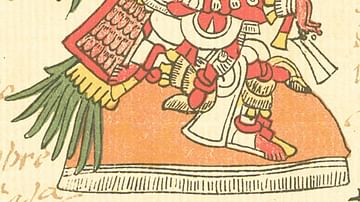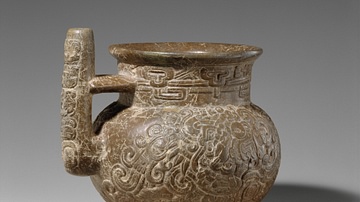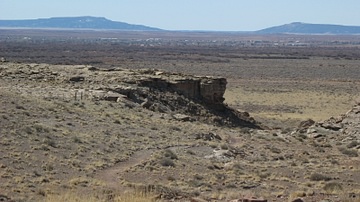Search
Did you mean: Empire?
Search Results

Definition
Kingdom of Jerusalem
The Kingdom of Jerusalem was a state created in 1099 CE by Crusaders and western settlers after the First Crusade (1095-1102 CE). With Jerusalem as its capital, the kingdom was the most important of the four Crusader States in the Middle...

Definition
Wari Civilization
The Wari civilization flourished in the coastal and highland areas of ancient Peru between c. 450 and c. 1000 CE. Based at their capital Huari, the Wari successfully exploited the diverse landscapes they controlled to construct an empire...

Definition
Wanka Civilization
The Wanka (also Wanca or Huanca) people occupied the highlands of ancient central Peru around Lake Junin and the Manataro, Chanchamayo and Tarma rivers. The culture flourished from the Middle to Late Horizon periods (600 CE - 1532 CE). Dwelling...

Definition
Tlahuizcalpantecuhtli
Tlahuizcalpantecuhtli, 'Dawn Lord,' was a Mesoamerican god who represented a menacing aspect of Venus, the morning star, and was one of the four gods which held up the sky. The people of the ancient Americas believed his rays could damage...

Definition
El Tajin
El Tajin is located near the coast of eastern Mexico and was an important Mesoamerican centre which flourished between 900 and 1100 CE. A part of the Veracruz culture, the city's architecture also displays both Maya and Oaxacan influences...

Definition
Casas Grandes
Casas Grandes or Paquimé was a major pre-Columbian city that flourished due to its extensive trading networks between c. 1150/1200-1450 CE in the northwest of present-day Chihuahua, Mexico. Casas Grandes is one of the largest and most important...

Definition
Audiencia
An audiencia began as a judicial institution in medieval Spain, but in the 16th century, it was applied as the highest form of local government in key cities of the Spanish Empire. An audiencia had a panel of judges made responsible for the...

Definition
Salado Culture
The Salado culture is a term used by historians and archaeologists to describe a pre-Columbian Southwestern culture that flourished from c. 1200-1450 CE in the Tonto Basin of what is now the southern parts of the present-day US states of...

Image
Maya Spouted Jar
This spouted vessel is one of the most elegantly sculpted stone containers in the corpus of Maya art. Its form with the vertical spout parallel to the central axis of the main chamber is known from the late 1st millennium B.C. and is especially...

Definition
Homolovi
Homolovi or Homolovi State Park (formerly: Homolovi Ruins State Park) is a cluster of archaeological sites that contains the ruins of eight pre-Columbian Ancestral Puebloan (Anasazi) and Hopi pueblos in addition to some 300 other remains...